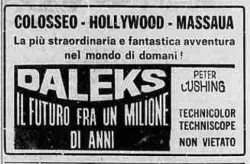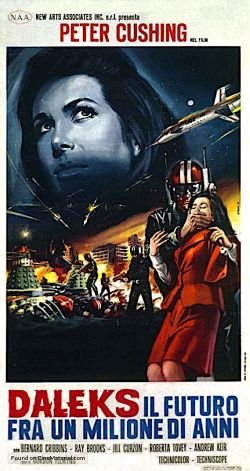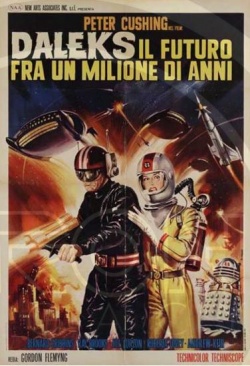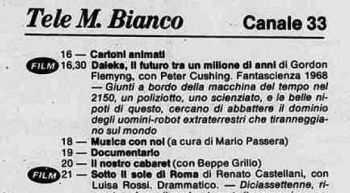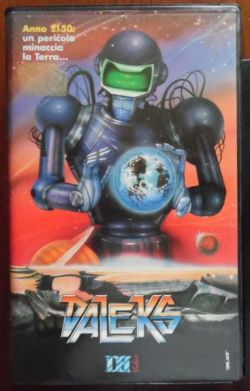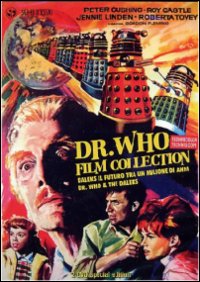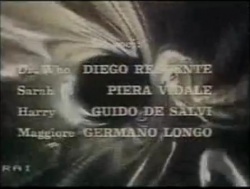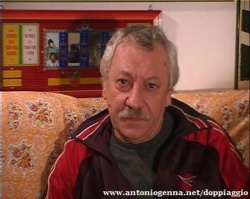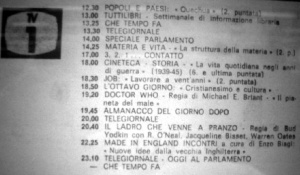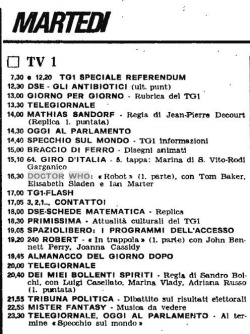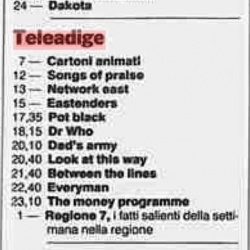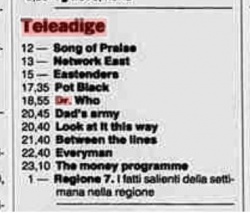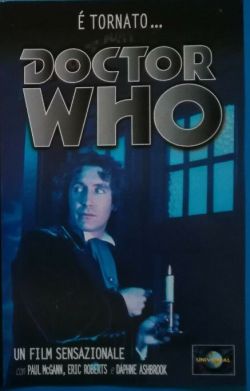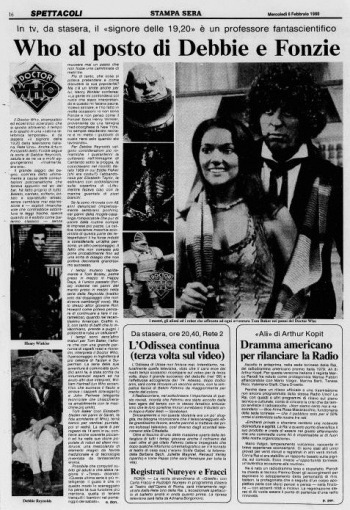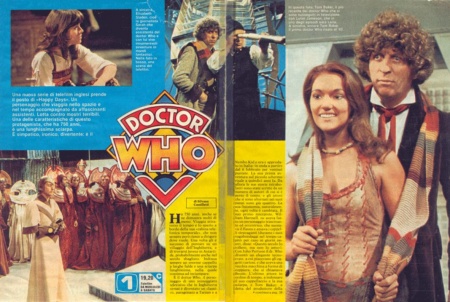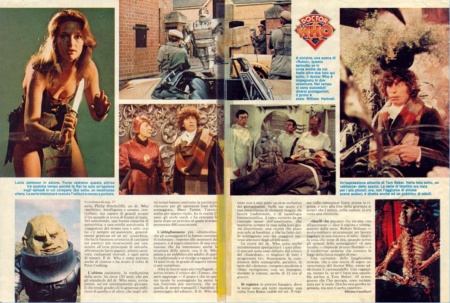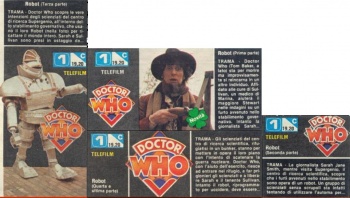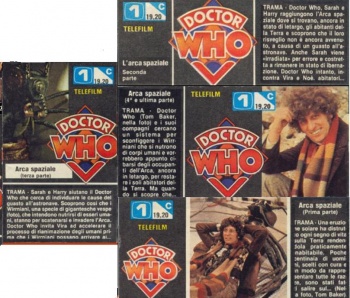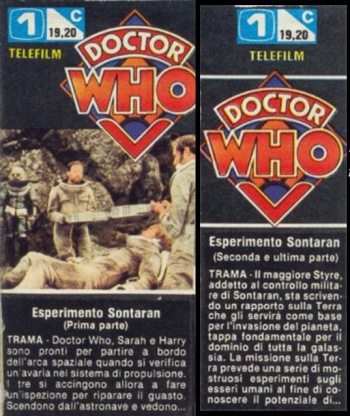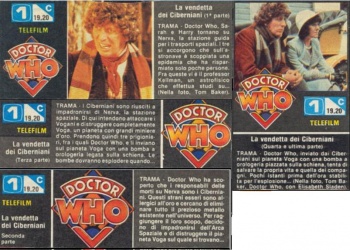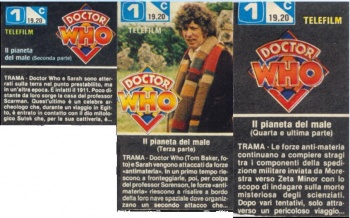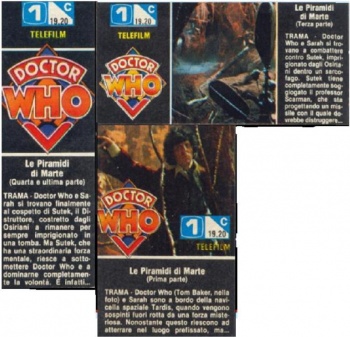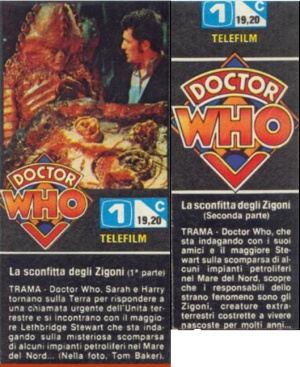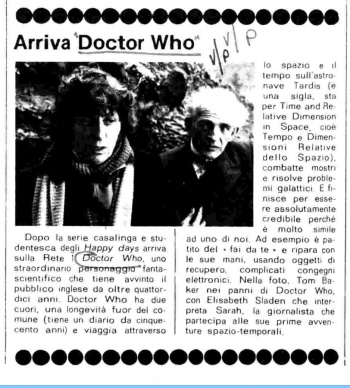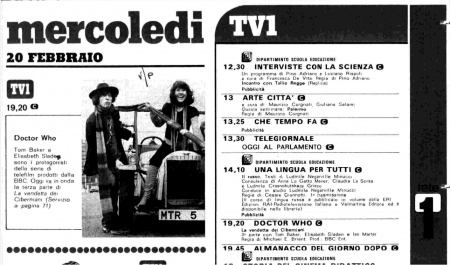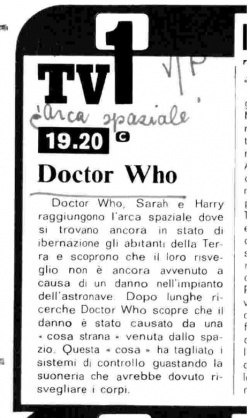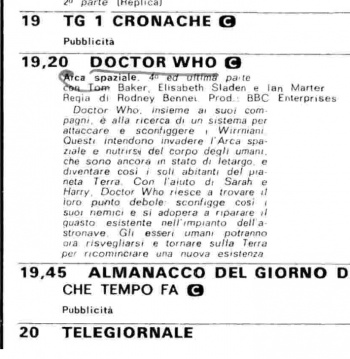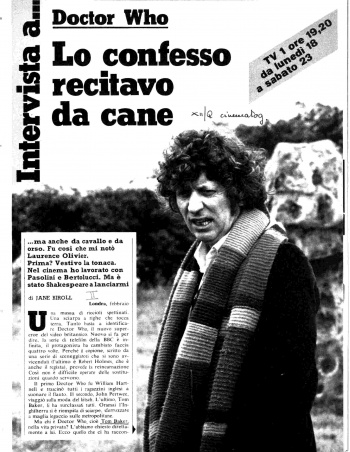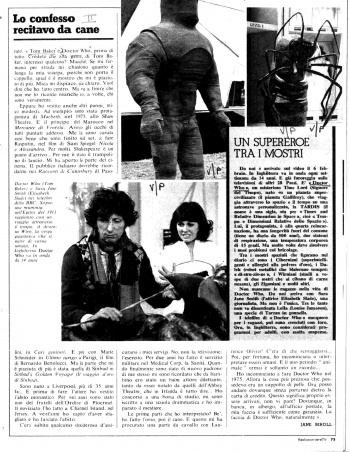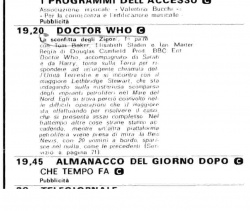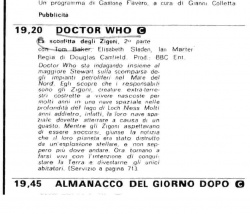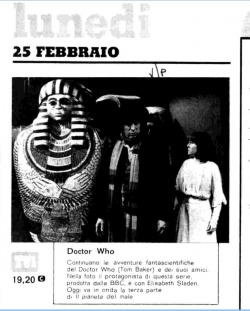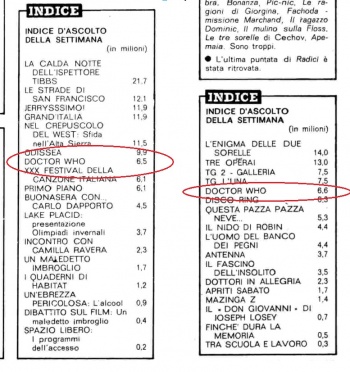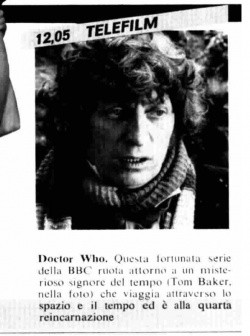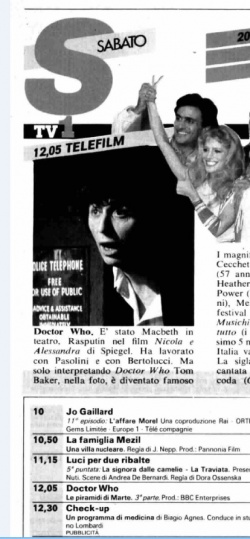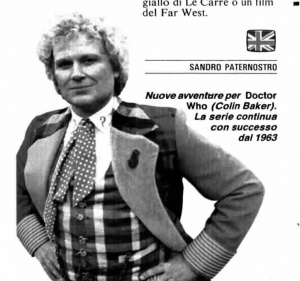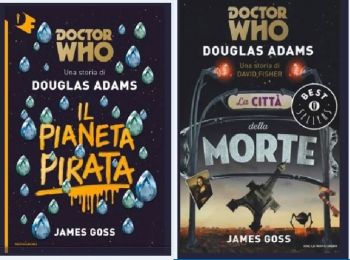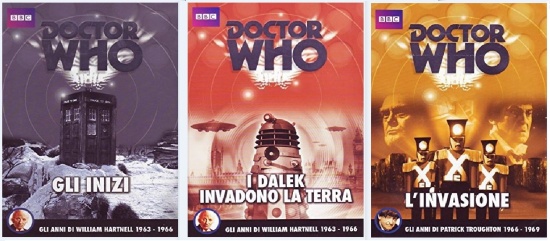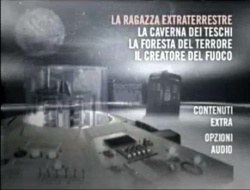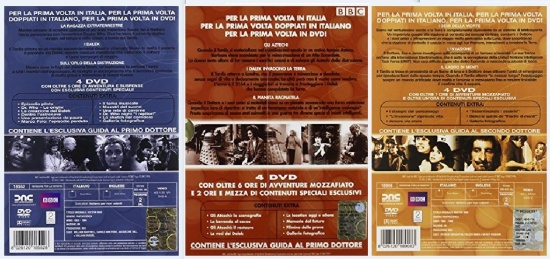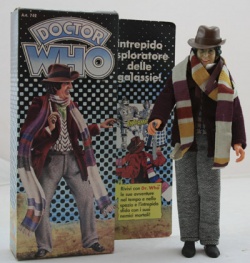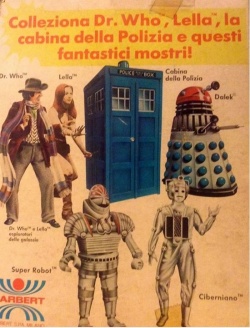Italy
ITALY is in southern Europe; it shares a border with France, Switzerland and Austria.
Profile
| Country Number (54?) | 1980 | SECOND WAVE |
| Region | Europe | |
| Television commenced | 1954 | |
| Colour System | 1977 | PAL |
| Population | 1980 | 57 million |
| TV Sets | 1980 | 12.87 million (incl 1.18 million in colour) |
| Language/s | Italian | Dubbed |
Television Stations / Channels
Italy began its television service in 1954.
There are a number of privately-owned stations, but the national broadcaster – and home to Doctor Who – is Radiotelevisione Italia (RAI). (The station would also have been available in San Marino and the Vatican City.)
All foreign television programmes are dubbed into Italian.
In 1982, RAI acquired a 10% ownership of a Monaco-based Italian-language television station, Telemontecarlo. After the takeover, broadcasts for that station were instead transmitted from Italy. Doctor Who aired on that station in 1983. See the profile for Monaco for further details.
By the late 1980s / early 1990s, the proliferation of satellite stations operating from the UK, such as BBC World Service Television Europe and BBC Prime, meant that Doctor Who in English would also have been available in Italy.
In 1992 and 1993 (at least) one of the later Italian terrestrial stations, Teleadige, transmitted BBC World Service signals to Italy. (Refer also to our coverage of these Cable and Satellite stations.)
DOCTOR WHO IN ITALY
Italy was the seventh country in Europe to screen Doctor Who. It was also one of a large group of countries that bought the series towards the end of the SECOND WAVE of sales (see Selling Doctor Who).
And as we've noted in the chapter, 110 Million Viewers, 54 countries had bought the series by then.
DALEK MOVIES
PETER CUSHING Movies
But many years before the good Doctor appeared on their television screens, Italians were exposed to Doctor Who in the form of the second of the two Peter Cushing Dalek movies.
The film -– under the title "Daleks - Il Futuro Tra un Milione di Anni" (Daleks – The Future of a Million Years) -– was classified by the Italian film censorship board on 9 August 1967. Distributed by New Arts Associates Inc (NAA), the earliest recorded screenings were on 12 February 1968 at the Colosseo, Hollywood and Massaua theatres (see clipping below). The film continued to be exhibited around the country in metropolitan and then small regional theatres through into the mid-1970s.
NOTE: the onscreen title of the film (also in the trailer) has the first word written as "DALEXS". This is an artistic embellishment rather than a spelling error. Also, the fourth word is written as "TRA" whereas the film posters and lobby cards spell it "FRA". In terms of Italian grammar, both are correct and sometimes used interchangeably, but since it is "Tra" that is seen on the film itself, that is the spelling we prefer.
One of the posters for the film was painted by Renato Casaro, with Jill Curzon as Louise featuring prominently.
Another poster is a collage of images taken from other sources, such as the June 1965 "Dalek Painting Book", and the 1959 Japanese film "Battle in Outer Space" (Italian title: "Inferno Nella Stratosfera").
The film also aired quite a few times on a number of different television stations in Italy in the 1970s and 1980s. The first recorded airing was on 3 November 1977, on Telecommerciale.
In 1987, the second film was released on VHS tape by DB Video. But this had a very different title: the cover shows a generic robot holding a globe, with the word "DALEKS" in large letters, with "Anno 2150, un pericola minaccia la Terra" ("Year 2150, A Danger Threatens the Earth") as the tag line in the top left corner.
Dr Who and the Daleks was made available in Italy for the first time when both films were released together in the "Dr Who Film Collection" DVD set from Sinister Film in October 2010.
The first movie (which wasn't given a translated title) was in English with Italian subtitles, while the second retained its Italian dub. Extras included the commentary from the UK DVD with added Italian subtitles, plus new introductions by Italian movie director Luigi Cozzi. An edited version (cut down to 44 minutes) of the Dalekmania documentary - retitled Dr Who Mania - also featured. The set also came with a booklet.
The films continued to air on television; the second was shown on channel RAI4 on 7 April 2012 at 11.45am.
Sinister re-released the "Dr Who Film Collection" on DVD and Blu-ray on 16 November 2020; both films were now fully restored in High Definition.
Although at first glance the box cover appears to be the same as the earlier 2010 release, it has the added text "RESTAURATO IN HD" and "SPECIAL EDITION" on it, and the layout of the back is very different. Other changes between the 2010 and 2020 disks include different menu layouts and music. The updated release also had the UK trailers (in English only), but did not come with a booklet.
On 24 May 2023 Sinister Films released yet another Blu-ray boxset of both films, being a Doctor Who 60th Anniversary commemorative edition. The new set features the full unedited Dalekmania documentary for the first time (but still under the alternative title "Dr. Who Mania"). Other extras include an audio commentary (in English) on the first film, an interview with Bernard Cribbins, a photo gallery, a 24-page booklet, and a reproduction of the 1967 Renato Casaro poster of Dalek Invasion.
BBC Records
In a BBC memo dated 7 July 1965, Italy was one of several European countries to which the series had been offered. The stories on offer were the first four - An Unearthly Child to Marco Polo (the latter possibly due to the guest character's Venice origins?). However, the offer was not accepted and no sale eventuated.
The Eighties - THE LOST CHAPTERS, records a sale to Italy of "(9)" stories (by 10 February 1987).
In DWM, Italy is identified in only 2 story Archives: 4E and 4H, "sold" in 1979. (In this case, it's a simple matter of the handwritten code "4C" being misread as "4E".)
Given that only seven stories aired, the reason for the imbalance could simply be due to two stories being purchased but not screened – due to censorship, perhaps? Or another possibility is that two of the stories are being counted twice because they were repeated.
Another possibility is that two of the sales to the other Italian channel (covered under Monaco) have been added onto the seven sold to RAI.
Stories bought and broadcast
TOM BAKER
Seven stories, 26 episodes:
| Code | English Title | eps | Italian Title | Translation |
|---|---|---|---|---|
| 4A | Robot | 4 | Robot | Robot |
| 4C | The Ark in Space | 4 | Arca Spaziale | Space Ark |
| 4B | The Sontaran Experiment | 2 | Esperimento Sontaran | Experiment Sontaran |
| 4D | Revenge of the Cybermen | 4 | La Vendetta dei Ciberniani | The Vendetta of the Cybermen |
| 4H | Planet of Evil | 4 | Il Pianeta del Male | The Planet of Evil |
| 4G | Pyramids of Mars | 4 | Le Piramidi di Marte | The Pyramids of Mars |
| 4F | Terror of the Zygons | 4 | La Sconfitta degli Zigoni | The Defeat of the Zygons |
The programme was supplied as PAL colour video tapes, which were dubbed into Italian.
It appears that RAI was also supplied with a copy of the BBC's 1978 Doctor Who Sound Effects LP record (the one with the TARDIS on the cover) first released in May 1978, to use for their dubs, since mismatched sound effects like the repeated bursts of the 'Tesh Gun' and 'Dalek Gun' from the album can be heard in other stories -- for instance the three short Dalek gun bursts are used for when the transmat is operated in The Sontaran Experiment.
The opening title sequence was adapted to include the Italian translations of the episode names and writer's credit:
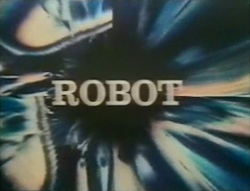 |
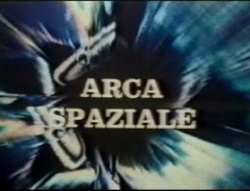
|
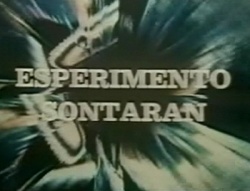 |
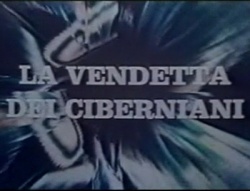
|
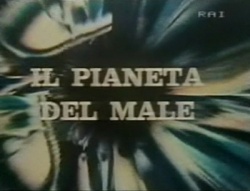 |
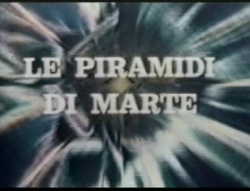
|
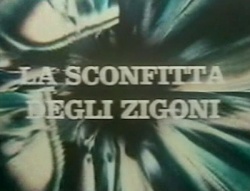 |
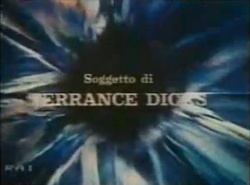
|
- The episodes had new electronic music, although some of the original score was retained, particularly for those scenes without dialogue.
- The closing titles were also recaptioned; only the main cast were given full credits, while the supporting actors were identified but not their character.
- Many of the dubbed Italian episodes are on YouTube:
- In the Italian adaptations, the character of the Doctor is actually called "Doctor Who". The Italian actors who portrayed the lead roles were:
- Diego Reggente (Doctor Who)
- Germano Longo (Brigadier Lethbridge-Stewart)
- Piera Vidale (Sarah Jane Smith)
- Guido de Salvi (Harry Sullivan)
- For a more detailed list of the Italian actors, visit: ITALIAN ACTORS for DOCTOR WHO
And although it is not covered by BroaDWcast, here are details of the voice-over actor for the new series:
|
|
|
|
Revenge of the Cybermen clip |
|
PAUL McGANN
TV Movie, 84 minutes:
| TVM | The TV Movie | 1 |
Transmission
TOM BAKER
RAI (1980-1981)
Although there are nine stories recorded in the 1987 sales document, only seven stories screened.
The series started on Radiotelevisione Italia (RAI) channel Rete 1 on Wednesday, 6 February 1980, at 7.20pm.
It aired six days a week (not on Sundays) in the same timeslot until Saturday, 1 March 1980, with Pyramids of Mars. The six stories aired in the correct story order, which was highly unusual, as many foreign broadcasters tended to screen those stories in production code order.
Although it was been billed as airing on 22 and 23 February 1980 in some publications, Terror of the Zygons did not air, and Planet of Evil screened instead on those and the next two days.
Fourteen months later, on Tuesday, 19 May 1981, a run of repeats aired, at 4.30pm, five days per week, Tuesdays to Saturdays. The repeat run was split into two blocks; the first, consisting of Robot, The Ark in Space and The Sontaran Experiment, ended on Saturday, 30 May 1981.
Then, after a short break (to allow for coverage of a national cycling event akin to the Tour de France), from Tuesday, 9 June 1981, the second block commenced, starting again with Robot. Parts three and four of the serial were pre-empted, to allow for live news coverage of the tragic event surrounding the failed rescue attempt of a trapped child, Alfredo Rampi. As far as can be determined, those two episodes were not rescheduled. The repeats continued the following week, with further repeats of The Ark in Space and The Sontaran Experiment, followed by the first repeat of Revenge of the Cybermen, ending Saturday, 27 June 1981.
Four months later, on Saturday, 3 October 1981, at 12.05pm in the afternoon, the series returned, but now screening only once per week; the first to screen was a new story, the previously pre-empted "missing" Terror of the Zygons, followed by a repeat screening of Planet of Evil and Pyramids of Mars.
There were 13 weeks in this run, but only 12 episodes: "La Sconfitta degli Zigoni" is billed for the first five weeks, so presumably for one of those dates the episode was pre-empted.
The series ended on Saturday, 26 December 1981.
Telemontecarlo / Monaco (1983)
From 9 November to 14 December 1983, then repeats until 20 January 1984 the same seven "Italian" Doctor Who serials aired on another station based in Italy; however since that station had originated in Monaco, we have covered those broadcasts on a separate profile for that country.
Teleadige (1992-1993)
During 1992 and 1993 the north-eastern, Trento-based terrestrial channel Teleadige (named after the river Adige), aired BBC programming via satellite. We think this may have been a relayed feed from the BBC World Service Television Europe service (later known as BBC Prime).
We have found only four clear listings – Sundays, 13 and 20 December 1992 at 6.15–8.10pm, and Sundays, 3 and 10 January 1993, at 6.55–8.45pm. We have not been able to determine when this run of episodes commenced, but the 10 January 1993 listing appears to be the last, as the slot is filled by another programme in subsequent weeks.
These episodes would therefore likely to have been a delayed broadcast of the 30 November to 18 December 1992 BBC2 repeat of The Daemons.
The extended timeslot (nearly two hours) suggests these were omnibus editions, but this might be down to the listings not printing every programme.
- See our coverage of BBC Prime HERE
PAUL McGANN
The 1996 Paul McGann TV Movie was released on VHS tape by MCA/Universal/CIC Video/UniVideo in 1997 - this was possibly only for Rental and not for home purchase.
It had the cover tagline "É TORNATO…" (He's Back). The tape was dubbed, and the actors providing the voices were:
- Marco Bolognesi (The Doctor)
- Fabrizio Temperini (Maestro)
- Fabrizia Castagnoli (Grace)
The film later aired in 1999 on the (now defunct) Italian pay channel,TVL (owned by Stream TV), however this broadcast was in English.
A DVD and Blu-ray edition of the film was planned to be released by distributor Pulp Video on 7 February 2017, under the non-translated title Doctor Who The Movie. However there was a problem with the master video file that was supplied to the distributor, so no further work was undertaken, and the sets were never released.
The following online retail sites still carry "ads" for the non-existent DVDs and BRs; all have the same "cover" graphic but this is likely to be only a placeholder image and not necessarily how the final discs would have appeared:
TV listings
| ← AIRDATES ...... (CLICK ICON TO GO TO TABLE SHOWING EPISODE BREAKDOWN AND AIRDATES - N/S = story title is Not Stated) |
TV listings have been obtained from the Rome newspaper Il Tempo, and the online archive of La Stampa and Radiocorriere.
Listings always gave the series name as "DOCTOR WHO".
"La Stampa"
The 6 February 1980 issue of La Stampa carried a short introductory article to the series (which featured a photo of Tom Baker and Louise Jameson, despite the latter not appearing in any of the episodes broadcast by RAI.)
"TV Sorrisi e Canzoni"
The Italian TV Guide, "TV Sorrisi e Canzoni", published its own listings, including a four-page introductory article about the series (which, like La Stampa, also featured photos of Louise Jameson as Leela, despite the fact that none of her stories aired!)
The weekly billings included brief summaries and photos:
"Radiocorriere"
Radiocorriere is the official weekly TV publication of RAI which had listings for Doctor Who as well as an introductory interview with Tom Baker.
A month before the series aired on RAI, readers of the 6 January 1980 issue were introduced to the series and character with this brief summary:
The 17-23 February 1980 issue, had a two-page feature about the series, and an interview with Tom Baker:
- INTERVIEW WITH.... DOCTOR WHO
- I CONFESS
- I ACTED AS A DOG
- .... but even as a horse and a bear. That is how I get noticed by Laurence Olivier. Before this? I wore a monk's tunic. In cinema I worked with Pasolini and Bertolucci. But it was Shakespeare that launched my career.
- by JANE BIROLL
- A mass of messy curls. A striped scarf that touches the ground. That is enough to identify Doctor Who, the new superhero of British television. New so to speak, the BBC tv series is infinite, the protagonist has changed his face four times. Because the scripts, written by a succession of rotating writers (Robert Holmes, who is also the director, is the current) include reincarnation. So it's not hard providing substitutions when it's needed.
- The first Doctor Who was William Hartnell who got all English kids into playing flute. The second, John Pertwee, sailed on the seas of kitsch. The last, Tom Baker, outclassed them all. By now England is filled with garter stitch scarfs knitted on subway trains. But who is Doctor Who, i.e. Tom Baker, in his private life? We asked him directly. Here's what he told us.
- "Tom Baker is Doctor Who, first of all. Do you think people care about Tom Baker? No way. If they stop me in the street they ask me how long is my scarf, why I don't wear the hat, what is the monster I liked the most. Not that I mind, to be clear. It means I succeeded. But it turns out that sometimes even I can't remember who I really am.
- And yet I dressed other parts, and not some bad ones at all. For example, in 1973 I was protagonist of Macbeth at the Shaw Theatre. And the Prince of Morocco in The Merchant of Venice. All eyes were on me. I got by so well that I ended up on set playing Rasputin in the Sam Spiegel's film Nicholas and Alexandra. Shakespeare is a definitive achievement for many... For me it was a springboard. It opened the cinema doors. The Italian public should remember me in Canterbury Tales by Pasolini, in Cari Genitori. And then with Marie Schneider in Last Tango in Paris. But the part I liked the most was that of Sinbad [sic] in The Golden Voyage of Sinbad.
- I was born in Liverpool more than 35 years ago... And before being an actor I wore the monastic habit. For six years I was one of the brothers of the Ploermer Order. I made the novitiate in Channel Island, Jersey. At twenty one I realised I made the wrong choice and left the habit.
- Then someone desired to employ me right away. No, not television: the army. I served in the medical corps for two years. When I was my own master again I remembered in my childhood I was a good amateur actor, much to get noticed by Abby Theatre people, and that says it all in Ireland... I competed for a scholarship, enrolled in drama school and learned the job.
- My first parts? Well, I was a bear, then a dog. And this got me a horse role with Laurence Olivier! There was enough to be discouraged… Then, fortunately, I started playing human beings. And now my "animal" period is just a recollection...
- I started doing Doctor Who in 1975. At the time, the most precious thing I owned was a leather coat. Now I can go anywhere without bringing along my credit card. That means I am quite an accomplished person, don't you think so? Everywhere, at the bank, at the post office, at the hotel, my face is a sufficient guarantee. The face of Doctor Who, of course."
The box-out reads:
- A SUPERHERO AMONG THE MONSTER
- He debuted on our screens on 6 February. In England he is broadcast every week for 14 years. And he's all the rage already in 28 countries. He's "Doctor Who", a mysterious Time Lord, born on an ultra-civilized planet (planet Gallifrey), travelling through time and space on a custom spaceship, the TARDIS (the name is an acronym for "Time and Relative Dimension in Space"). He, the protagonist, is in his fourth reincarnation, has an uncommon longevity (he keeps a 500 year diary), two respiratory systems, a body temperature of 15 degrees. But sometimes he has to solve his problems recurring to bricolage.
- Among the monsters recorded in the diary are the Ciberniani (super-intelligent and allergic to gold powder), the Dalek (metal robots always blabbering: "de-struc-tion"), the Wirniani (two meters tall lookalike wasps feeding on human flesh) the Zigoniani and many others.
- Girls are not lacking in Doctor Who's life. He arrives in Italy with Sara Jane Smith (the actress Elizabeth Slade), a journalist, but she's not the only one. Among the many, it should not be forgotten Leila (Louise Jameson), sort of Tarzan in a skirt.
- The Doctor Who series was created for the kids, then it grew up with them. Now, in England, it is considered a programme for the adults, with a lot of suspense".
On 22 and 23 February 1980, the listings billed Terror of the Zygons, when in actual fact, Planet of Evil aired those two nights. (Terror of the Zygons for reasons unknown did not air until October 1981.) The correct billings for Planet of Evil appeared for the next two dates.
A month after the series had debuted, the ratings for the channel were published in the 2 March and 9 March 1980 issues, both showing a healthy rating of 6.5 million and 6.6 million for the series:
|
Italian Merchandise
Books
Some of the recent novelisations based on Douglas Adams scripts have been translated:
- IL PIANETA PIRATA (The Pirate Planet)
- LA CITTÀ DELLA MORTE (City of Death)
Also translated and published in Italy were various Titan comic collections, and original novels based on the New Series.
Videos and DVDs
The 1996 Paul McGann TV Movie was released on video tape in 1997 -- see above.
It was also out on DVD and Blu-ray from Pulp Video on 7 February 2017, although we have not been able to source proper images of the box covers to confirm - see above.
And as also noted above, the Peter Cushing / Dalek movies were also released on tape and DVD.
The 1999 DVD release of the special edition re-edit of The Five Doctors had Italian subtitles as an alternative language option (although it's not known whether the DVD was actually sold there).
Two DVD box sets of William Hartnell stories were released on DVD in the late-2000s, with Italian dubs:
- Doctor Who - Gli Inizi (2007) (The Beginning) (with An Unearthly Child, The Daleks, Inside the Spaceship)
- Doctor Who - I Dalek Invadono la Terra (2008) (with The Aztecs, The Dalek Invasion of Earth, The Web Planet)
- The voice-artists were:
- Enrico Maggi (Doctor Who)
- Cinzia Massironi (Barbara)
- Claudio Beccari (Ian)
- Elisabetta Spinelli (Susan)
- The voice-artists were:
A third DVD box set of three Patrick Troughton stories was also released:
- Doctor Who - L'Invasione (with The Mind Robber, The Invasion and The Seeds of Death)
- For a more detailed list of the Italian actors, visit: ITALIAN ACTORS for DOCTOR WHO
|
|
|
|
Icecreams (Dalek)
In the 1970s, a popular brand of ice-lolly was manufactured by Eldorado. One of the flavoured icecreams was called "Dalek", a name possibly derived from a contraction of the Italian term "da leccare", which literally means "to lick"! The "Dalek" lolly was purple and rocket-shaped. An advertisement for the ice treats, depicted all the lollies standing on "flying saucers", so any link between this product and Doctor Who must be a coincidence.
Dolls
An Italian company called Harbert released a version of the Denys Fisher fourth Doctor / Tom Baker doll in 1979. There is uncertainty as to whether or not the other figures in the set (Cyberman, Dalek, Leela and TARDIS) were also released, despite reference to them appearing on the Baker doll's packaging.
Fandom in Italy
In 1983, the address of the Italian Doctor Who Fan Club was given as via Bologna 33/23, Genova 16127, Italy in the book, Doctor Who – A Celebration.
Today, Italy has a very active online presence; the following are the source of many of the clippings used (with permission) on this site:
- WEBSITES:
- The following websites feature information on Doctor Who in Italy:
And have a look at this music video clip from Italy – especially the last minute…
(Grateful thanks are due to Gabriella and Antonio Iona for providing the screen-grabs, clippings and translations)
Italy in Doctor Who
- Marco Polo's home city is Venice.
- The Romans is set in and around Rome of AD 64.
- The Animus seizes control of the gold bracelet given to Barbara by Nero (The Web Planet).
- Luigi Ferrigo (played by Gabor Baraker) is a trader from Genoa. Conrad of Tyre is mentioned. Princess Joanna threatens to see the Pope in Rome (The Crusade).
- The Doctor likens the Morok Empire to that of the Roman Empire (The Space Museum).
- The Monk says he once discussed the idea of powered flight with Leonardo da Vinci (The Time Meddler).
- The Cardinal of Lorraine is in Rome (The Massacre).
- Nero is said to have lived in the First Segment of Time (The Ark).
- Snowcap Base crewman, Tito (Shane Shelton), is Italian (The Tenth Planet).
- A brochure for "Summer Holidays in Italy" can be seen in the travel agency window in Daleks - Invasion Earth 2150 AD.
- Leonardo da Vinci is also named in The Underwater Menace, The Masque of Mandragora; the Doctor visits Leonardo's studio in Florence in City of Death.
- Chameleon Tours fly regularly to Rome (The Faceless Ones).
- Wheel Three crewmember, Enrico Casali (Donald Sumpter) is Italian (The Wheel in Space).
- There is a T-Mat station in Rome. Aircraft designs drawn by Leonardo da Vinci feature in The Seeds of Death.
- A legion of soldiers is abducted and placed in the "Roman Zone" to fight in The War Games.
- The Doctor enjoyed a piece of Gorgonzola cheese at Sir Reginald Styles's mansion in Day of the Daleks.
- The Doctor mentions Edward Gibbon's book, The History of the Decline and Fall of the Roman Empire (The Mutants).
- Galileo is mentioned by Professor Kettlewell in Robot, and by the Doctor in The Masque of Mandragora and The Sun Makers.
- The Doctor mentions Mount Vesuvius and Pompeii in The Brain of Morbius.
- The Masque of Mandragora is set in San Marino, circa 1492. The story also name-checks the Italian cities of Rome, Florence, Naples, Milan, Venice, and Padua.
- The Doctor mentions Julius Caesar and Tacitus (The Stones of Blood).
- The Doctor mentions Christopher Columbus in The Armageddon Factor. He carries a card with Columbus's name on it in his wallet (The Two Doctors).
- The Roman Empire is mentioned by Mena (The Leisure Hive).
- Rome is alluded to when comparison is made between using humans and Vervoids as slaves (The Trial of a Time Lord).
- The Doctor mentions Michelangelo (Time and the Rani).
